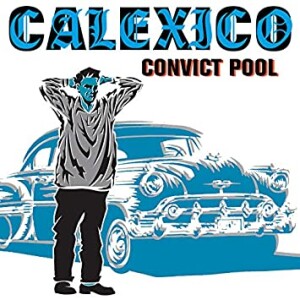 The prolific desert-rock combo Calexico, after touring for a year behind their latest CD Feast of Wire, offered this EP as a sampler of what’s new in their live show. It features three cover songs that showcase some of the band’s diverse influences, and three originals that show off frontman Joey Burns’ continuing growth as a songwriter.
The prolific desert-rock combo Calexico, after touring for a year behind their latest CD Feast of Wire, offered this EP as a sampler of what’s new in their live show. It features three cover songs that showcase some of the band’s diverse influences, and three originals that show off frontman Joey Burns’ continuing growth as a songwriter.
It opens with a solid cover of “Alone Again Or,” a rocking bit of psychedelic folk-rock from the Sixties cult band Love. As always, Calexico makes this one their own with a soaring, mariachi-like double-trumpet attack from Jacob Valenzuela and Martin Wenk.
The second cover is an English translation of “Si Tu Disais,” by the French folk-pop singer Dominique Ane. Drummer John Convertino’s daughter Mia introduces this one with a whispered rendition of the title, and Burns sings lead and plays his trademark nylon-string acoustic guitar on this one.
Bursting out of the gate next is “Corona,” a south-of-the-border reworking of a song by California funk-punk-rockers the Minutemen. The mariachi-style arrangement complements the blue-collar theme of the song by the late D. Boon, mixing environmentally conscious lyrics with romantic longing and a peppy two-step beat.
For original songs, there’s the loping “Sirena,” an anthemic bi-lingual rocker with maritime imagery in keeping with the subject matter, a mermaid, sirena in Spanish. The instrumental “Praskovia” was co-written by Burns and Convertino from an accordion lick the latter came up with in a practice session. It’s a waltz-time tune with Balkan or Roma overtones, a real workout for Convertino on accordion with some stinging electric guitar from Tucson compadre Naim Amor and more spine-tingling trumpet work from Wenk and Valenzuela.
But the real treasure here is the title track, a powerful bit of protest folk from Burns and Convertino that’s worthy of a master’s thesis in pop songwriting. Burns has said in interviews elsewhere that his inspiration came from a skateboarding magazine that discussed the designs of various backyard swimming pools in southern California where the sport had its modern renaissance in the early 1980s. Burns apparently lifted many of the lyrics directly from the magazine writer’s rhapsodic description of the “Convict Pool,” a left-handed kidney shape. But as all the best songwriters do, he tweaked the words into a subtly powerful commentary on current politics.
The article’s “this masterpiece of a left-hand kidney” becomes “this masterpiece of a right-wing kidney punch,” where “executions are nearly flawless.” There’s a reference to “Tony and George,” the leaders, respectively, of England and the United States, and the cryptic line, “avoid the nipple, protrusion on the wall,” which to me speaks of Attorney General John Ashcroft’s decision to move his press briefings away from the Justice Department’s famous statue of blindfolded, scale-balancing Justice — because the statue’s naked breast appeared behind Ashcroft in photographs.
Musically, “Convict Pool” is one of the most deceptively simple-sounding but powerful songs in Calexico’s repertoir. Burns strums, at times forcefully, on his acoustic guitar, and Convertino alternates his more usual use of brushes with a mallet attack. Convertino’s drum-rolls evoke ominous thunder as Burns leans into the chorus of “Esca-a-ape! convict pool/escape, social tool/within/escape … convict pool.”
All six tracks on Convict Pool stand on their own, and together they’re as vital and passionate as many a full-length CD released in 2004.
(Quarterstick, 2004)
